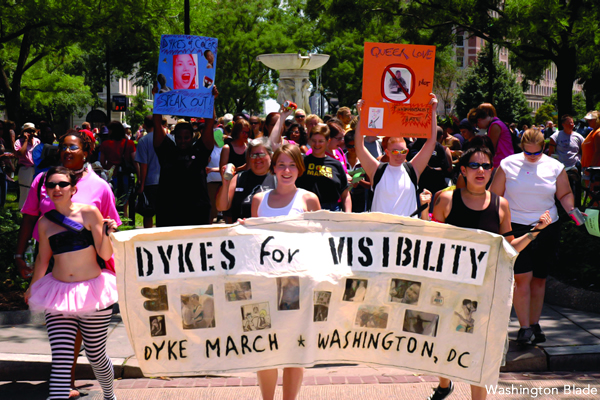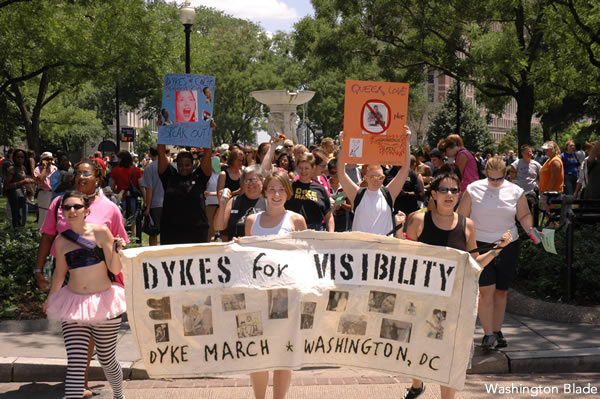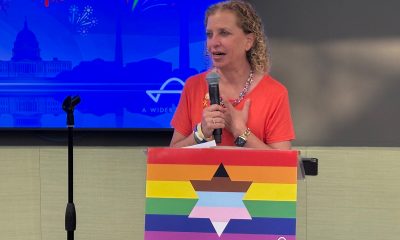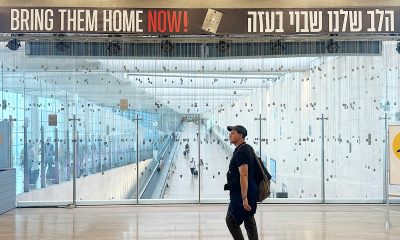Opinions
We don’t have to choose between Dyke and Jewish identities
An inclusive, celebratory, and safe DC Dyke March


We’re Jewish Dykes. We’re Dyke-ish Jews. We don’t have to choose.
We love being Jewish and we love being Dykes. As with all identities there have been paths and twists and turns to reach that conclusion, we had to fight for them and we had to grow to love them, at this point it feels amazing to be able to say both of those things with certainty. Sometimes it feels like we had to come out twice in our Jewish communities, once as Dykes (or really over and over again) and again as self-loving Anti-Zionists.
For that reason, we dedicated time and energy to helping organize the Dyke March as specifically and explicitly Jewish Anti-Zionist Dykes. The Dyke March has been inclusive, supportive and encouraging of our Dyke-y Jewishness and Jewish Dykey-ness. From the first DC Dyke March meeting we’ve been out and proud queer Jewish dykes. Other DC Dyke March organizers have been open and responsive to questions, concerns and ideas we have regarding keeping the DC Dyke March a welcoming space for Jewish dykes. We knew from the start we wanted to be a part of an inclusive, celebratory, and safe as possible Dyke March.
Recently, a Zionist contacted the DC Dyke March with the deliberate goal of making it sound as though Jews are unwelcome at the DC Dyke March — a claim that erases us Jews who have been organizing so heavily. They contacted a number of news organizations including the Washington Post, and the pinkwashing organization A Wider Bridge. A Wider Bridge is the organization that accused the Chicago Dyke March of anti-Semitism in 2017 because of the group’s anti-Zionist stance. The goal of these groups seems to be to paint the DC Dyke March as a place that’s unwelcome to Jews because of our anti-Zionist views.
The claim is that we are banning Jewish symbols, which is entirely untrue. We are asking people to not bring nationalist symbols because violent nationalism does not fit with our vision of queer liberation. And because we need the march to be a space that is as welcoming to Palestinian Dykes as it is to Jewish Dykes. The “Jewish Pride Flag” seemed to only rise in popularity after the Chicago Dyke March — it was never a flag that we felt directly connected to, and it does not represent all Jewish Dykes. The flag is a Star of David placed in the center, superimposed over a rainbow flag, and is almost entirely reminiscent of the Israeli flag, swapping out the blue and white for a rainbow. The star of David itself only became publicly popular as a symbol of Judaism in the 19th century — it coincided with the First Zionist Congress choosing the six-sided star for the flag of the future Israeli nation state in 1897. That being said, the Star of David represents more than just Israel when not on a flag and can be brought to the march in many other forms without question. It is not the only symbol available to us. We welcome yarmulkes, tallitot, tefillin, rainbow pomegranates, Lions of Judah, Hamsas, chai, a menorah and anything that doesn’t directly replicate nationalist images and symbols.
Our Jewish values teach us that our struggles are interconnected and that our liberation is bound up with the liberation of all peoples, Palestinians included. When we hear allegations that the Dyke March is anti-Semitic for taking a pro-Palestine stance, we feel betrayed by the Jewish community. We choose to prioritize Palestinian lives and justice in Palestine over lazy symbols. The Dyke March is about welcoming our whole selves, not about welcoming the politics that harm members of our community. Nationalism is one of those harmful ideologies. As we help build the inclusive, welcoming space of the DC Dyke March, we feel extra proud to be feygeles with a lot of chutzpah — to be openly self-loving Anti-Zionist Dyke Jews.
When other Jews conflate anti-Semitism with anti-Zionism and anti-nationalism, it makes us angry and sad. It makes us feel like we are further from true liberation. To be a Jew is to have a history of trauma and oppression. We believe we can build a world where we fight against and end further trauma and oppression, not carry it on further.
The organizers of the Dyke March were incredibly supportive when we wanted to have nuanced conversations about the difference between anti-Semitism and anti-Zionism to further the goal of collective queer liberation. Stephanie Skora said it perfectly in her 2018 article, “Dyke March represents an unfettered quest for justice, and the building of community in diaspora. It is upheld by a deeply cherished shared culture, and ritually gathers around food, music, art, and joy.”
At every Dyke March meeting we have worn our stars of David and chai around our necks. We never felt like we had to hide that part of ourselves. Yet now we feel like we have to hide parts of ourselves, the parts of us that believe a better world is yet to come, in the Jewish community. We understand the pain and the hurt. We believe that the responsibility of that pain and hurt lies with Zionism. We are angry that Israel has taken Jewish symbols and converted them into symbols of nationalism and xenophobia. We are angry that it has created a hierarchy in which Jewish voices are more valid than others, where Jewish comfort is seen as more important than Palestinian lives. We are angry that it exploits Queers and Pride to pinkwash the occupation and settler colonial violence. We are sad that Zionism has stolen vibrant Diasporic and diverse Jewish identities from us, but slowly, and through tough conversations like these ones, we are taking it back.
Yael Horowitz and Rae Gaines are organizers with the DC Dyke March, happening on Friday, June 7.

Renee Good. Alex Pretti.
During this last year, I wondered who would be the first U.S. citizen to be shot by our government. It was not a matter of if, but when. Always.
And now we know.
I thought it would be soldiers. But the masked men got there first. Because when you mix guns and protests, guns inevitably go off. The powers that be always knew it, hoped for it, and wanted it to happen.
Why? Because masked men and guns instill fear. And that’s the point. Ask yourself when’s the last time you saw masked men and guns in our cities, or anywhere for that matter. I always thought that men masked men with guns robbed banks. I was wrong.
Masked men want to rob us of our dignity as human beings. Of our assurance in the calmness and contentment of our communities. They want to rob us of our trust in our institutions, and our faith in each other. And truly they want to rob us of the happiness and joy that we all constantly yearn to find in our lives.
But our only collective ability as a nation to push back is our protests. Peaceful protests. As Renee and Alex did.
But peaceful protests? Because they are the perfect power to shame the cowardice of those that believe guns and force are the only true authority. Fortunately, our last hope and fiercest ally is our Constitution, which gives us the power — and the right — to protest.
How much more peaceful can you get when you hear Renee Good’s last words, “I’m not mad at you, Dude.” I may be mad at the system, the government, the powers of unknown people pulling the strings but not you personally. “Dude.” Peaceful to the last word.
Yet, what becomes lost in the frantic pace of hair-trigger news cycles, of officials declaring impetuous damnations alongside johnny-on-the spot podcasters spouting their split-second opinions are the two human beings who have lost their lives.
How habituated we’ve become as we instantly devour their instant obituaries. The sum of their lives declared in less than 10 seconds of cellphone video. They haven’t just lost their lives. They’ve lost all of their lives. And now we watch over and over again as their death is re-revealed, re-churned, re-evaluated, and re-consumed. In that endless repetition, we forget the meaning of life itself.
We must remember that Renee and Alex believed in their communities, in the purpose of their work, in the happiness of their loves and lives, and in the dignity and curiosity of life itself. They were singular individuals who did not deserve to die at the end of a gun barrel for any reason, ever.
How fitting that Renee was a poet. Sometimes in confronting the massiveness of loss in our lives, we look to our poetry and our psalms, our hymns and our lullabies, to find a moment of solace in our communal grief, and to remember Renee and Alex, for what they gave us in life.
Yet, at this moment, I cannot escape the reality of what was taken from them so soon, so violently and so forever. They were exceptionally courageous and normal people, and for that reason, I must remember them through a poem to explain to me, and others, the unexplainable.
I dream of this not happening.
I dream this day and night.
For none of this is real.
And none of this is right.
I dream of these sons and daughters
who now will not go home,
and dream of their mothers and fathers,
who now must stand alone.
I dream of all the flowers that they will never hold —
the kisses never shared again, the secrets to not be told.
I dream of all the sunsets that for them will never set,
I dream of all the love they gave and now they must forget.
I dream of all their dinners
with wine to never spill,
or books to read, or bread to break
or babies to be held.
I dream of each one still reaching
in the middle of the night,
for a hand that needs another
to stop a nightmare’s flight.
I dream of them not dreaming,
which I could never do,
for how can you not dream a dream
that never will come true.
I dream of this not happening.
I dream this day and night.
For none of this is real
And none of this is right.
Carew Papritz is the award-winning author of “The Legacy Letters,” who inspires kids to read through his “I Love to Read” and the “First-Ever Book Signing” YouTube series.
Opinions
Gay Treasury Secretary’s silence on LGBTQ issues shows he is scum
Scott Bessent is a betrayal to the community

We all know the felon in the White House is basically a POS. He is an evil, deranged, excuse for a man, out only for himself. But what is just as sad for me is the members of the LGBTQ community serving in his administration who are willing to stand by silently, while he screws the community in so many ways. The leader, with his silence on these issues, is the highest ranking “out” gay ever appointed to the Cabinet; the current secretary of the treasury, the scum who goes by the name, Scott Bessent.
Bessent has an interesting background based on his Wikipedia page. He is from South Carolina and is what I would call obscenely wealthy. According to his financial assets disclosure to the U.S. Office of Government Ethics, Bessent’s net worth was at least $521 million as of Dec. 28, 2024; his actual net worth is speculated to be around $600 million. He married John Freeman, a former New York City prosecutor, in 2011. They have two children, born through surrogacy. I often wonder why guys like Bessent conveniently forget how much they owe to the activists in the LGBTQ community who fought for the right for them to marry and have those children. Two additional interesting points in the Wikipedia post are Bessent reportedly has a close friendship with Donald Trump’s brother Robert, whose ex-wife, Blaine Trump, is the godmother of his daughter. The other is disgraced member of the U.S. House of Representatives, John Jenrette, is his uncle.
Bessent has stood silent during all the administrations attacks on the LGBTQ community. What does he fear? This administration has kicked members of the trans community out of the military. Those who bravely risked their lives for our country. The administration’s policies attacking them has literally put their lives in danger. This administration supports removing books about the LGBTQ community from libraries, and at one point even removed information from the Pentagon website on the Enola Gay, the plane that dropped the first atomic bomb, thinking it might refer to a gay person. It was actually named after Enola Gay Tibbets, the mother of the pilot, Col. Paul Tibbets. That is how dumb they are. Bessent stood silent during WorldPride while countries around the world told their LGBTQ citizens to avoid coming to the United States, as it wouldn’t be safe for them, because of the felon’s policies.
Now the administration has desecrated the one national monument saluting the LGBTQ community, Stonewall, in New York City, by ordering the removal of the rainbow flag. The monument honors the people who get credit for beginning the fight for equality that now allows Bessent, and his husband and children, to live their lives to the fullest. That was before this administration he serves came into office. I hope his children will grow up understanding how disgusting their father’s lack of action was. That they learn the history of the LGBTQ community and understand the guts it took for a college student Zach Wahls, now running for the U.S. Senate from Iowa, to speak out for his “two moms” in the Iowa State Legislature in 2011, defending their right to marry.
Bessent is sadly representative of the slew of gays in the administration, all remaining silent on the attacks on the community. They are mostly members of the Log Cabin Republicans who have given up on their principles, if they ever had any, to be subservient to the felon, and the fascists around him, all for a job.
There are so many like them who supported the felon in the last election. Some who believed in Project 2025, others who didn’t bother to read it. Many continue to stand with him, with the sycophants in the Congress, and the incompetents and fascists in the administration, as they work to destroy our country and end the democracy that has served us so well for 250 years. To keep out all immigrants from a nation of immigrants. They all seem to forget it was immigrants who built our country, who fought against a king, and won. These sycophants now support the man who wants to be king. Who openly says, “I am president I can do anything only based on my own morality,” which history clearly shows us he has none.
I believe we will survive these horrendous times in American history. We have fought a king before and won. We have kept our country alive and thriving through a civil war. We the people will defeat the felon and his minions, along with the likes of those who stood by silently like Scott Bessent. They seem to forget “Silence = Death.”
Peter Rosenstein is a longtime LGBTQ rights and Democratic Party activist.
Opinions
Unconventional love: Or, fuck it, let’s choose each other again
On Valentine’s Day, the kind of connection worth celebrating

There’s a moment at the end of “Love Jones” — the greatest Black love movie of the 21st century — when Darius stands in the rain, stripped of bravado, stripped of pride, stripped of all the cleverness that once protected him.
“I want us to be together again,” he says. “For as long as we can be.”
Not forever. Not happily ever after. Just again. And for as long as we can. That line alone dismantles the fairy tale.
“Love Jones” earns its place in the canon not because it is flawless, but because it is honest. It gave us Black love without sanitizing it. Black intellect without pretension. Black romance without guarantees. It told the truth: that love between two whole people is often clumsy, ego-driven, tender, frustrating, intoxicating—and still worth choosing.
That same emotional truth lives at the end of “Eternal Sunshine of the Spotless Mind,” my favorite movie of all time. Joel and Clementine, having erased each other, accidentally fall back into love. When they finally listen to the tapes that reveal exactly how badly they hurt one another, Clementine does something radical: she tells the truth.
“I’m not perfect,” she says. “I’ll get bored. I’ll feel trapped. That’s what happens with me.”
She doesn’t ask Joel to deny reality. She invites him into it. Joel’s response isn’t poetic. It isn’t eloquent. It’s not even particularly brave. He shrugs.
“Ok.”
That “OK” is one of the most honest declarations of love ever written. Because it says: I hear you. I see the ending. I know the risk. And I’m choosing you anyway.
Both films are saying the same thing in different languages. Nina and Darius. Clementine and Joel. Artists and thinkers. Romantics who hurt each other not because they don’t care — but because they do. Deeply. Imperfectly. Humanly.
They argue. They retreat. They miscommunicate. They choose pride over vulnerability and distance over repair. Love doesn’t fail because they’re careless — it fails because love is not clean.
What makes “Love Jones” the greatest Black love movie of the 21st century is that it refuses to lie about this. It doesn’t sell permanence. It sells presence. It doesn’t promise destiny. It offers choice.
And at the end — just like “Eternal Sunshine” — the choice is made again, this time with eyes wide open.
When Nina asks, “How do we do this?” Darius doesn’t pretend to know.
“I don’t know.”
That’s the point.
Love isn’t a blueprint. It’s an agreement to walk forward without one.
I recently asked my partner if he believed in soul mates. He said no—without hesitation. When he asked me, I told him I believe you can have more than one soul mate, romantic or platonic. That a soul mate isn’t someone who saves you — it’s someone whose soul recognizes yours at a particular moment in time.
He paused. Then said, “OK. With those caveats, I believe.”
That felt like a Joel shrug. A grown one.
We’ve been sold a version of love that collapses under scrutiny. Fairy tales promised permanence without effort. Celebrity marriages promised aspiration without truth. And then reality — messy, public, human—stepped in. Will and Jada didn’t kill love for me. They clarified it.
No relationship is perfect. No love is untouched by disappointment. No bond survives without negotiation, humility, and repair. What matters isn’t whether love lasts forever. What matters is whether, when confronted with truth, you still say yes.
“Love Jones” ends in the rain. “Eternal Sunshine” ends in a hallway. No swelling orchestras. No guarantees. Just two people standing at the edge of uncertainty saying: Fuck it. I love you. Let’s do it again.
That’s not naïve love. That’s courageous love.
And on Valentine’s Day — of all days — that’s the kind worth celebrating.
Randal C. Smith is a Chicago-based attorney and writer focusing on labor and employment law, civil rights, and administrative governance.


















